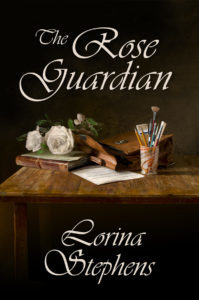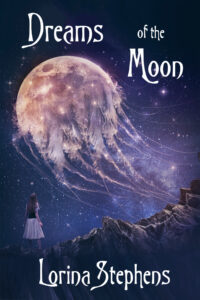Lorina Stephens's Blog, page 11
May 5, 2021
Review: Five Little Indians, by Michelle Good
 Five Little Indians by Michelle Good
Five Little Indians by Michelle Good
My rating: 3 of 5 stars
It is important to begin this review with the fact I’m Caucasian, first generation Italian, third generation Irish, born in Canada, live a life which many would call privileged, but would do so without understanding of family background, struggle, trauma. I do understand being a victim. But I do not have an understanding of residential school trauma. Having said all that, I do very much find compassion for, and empathy and solidarity with, my First Nations people. I hear your struggle. I champion your cause. Let us leave no one in the darkness of despair, victimization, and oppression. Let us move into the light, into healing, into a positive state.
Given that preface then, allow me to comment on the literary merit, not the humanitarian merit, of Michelle Good’s novel. It is an important novel, if for no other reason than the fact it is one more very strong, intimate and authoritative indictment of residential schools, of religious zeal, and human cruelty.
As a literary work, however, I found the prose simplistic and without the impact great writing can cement to a great story. I also found the characterization a bit Archie-comics, a bit wooden, and because of this I very much felt, from a purely writers’ craft perspective, that Good could have done better if she had editors who cared as much about good writing as they did about the importance of her story.
Good chooses to tell the story of five different people who all came out of the same horrific residential school, how their lives intersected after they emerged, and how their lives either dissipated and shattered, or found cohesion and resolution. She does manage the different timelines and perspectives very well. There is no confusion, and so the story moves along quite well.
But is it a brilliantly told story? When you compare this story to Boyden’s Wenjack or The Orenda, for which he was unjustly vilified in my view, there is no comparison. Boyden tears emotion out of your throat, leaves you breathless and hurting, transported into the pain and horror of the characters he lifts off the page. Good, on the other hand, tells stories ABOUT people. She doesn’t create people who tell us their story. There is a profound difference.
Let it not be thought, however, that Good’s novel isn’t worthy of your time. It is. Read it. It’s important.
May 3, 2021
Reviewed in Ottawa Review of Books
I am just thrilled to learn my recent novel, The Rose Guardian, has been reviewed by Robert Runté in The Ottawa Review of Books. How amazing is that?
 The full review is here:
The full review is here:
It starts with a funeral.
Una Cotter is dead, and her sixty-something daughter, Vi, is left to sort out her feelings about her mother, her family, her childhood, and her ambiguous inheritance. One cannot but grieve the passing of one’s mother, but when Una Cotter was your mom, it’s complicated.
This is a quiet, thoughtful book that will appeal to anyone working through the loss of a parent or a midlife crisis. Lorina Stephens paints a multi-layered canvas of loss and release, of denial and self-examination, of blame and understanding. The portraiture that emerges as each layer is laid down is a complex and nuanced examination of three generations of women, each the product of their era, but also slightly out of phase. Vi learns much that had been hidden when she inherits Una’s diaries, but it’s Vi’s re-examination of her own childhood that provides the greatest insights into her family’s dynamic and the need to understand and come to terms with her own issues.
There is a lot of food for thought here, and what I liked most about the book was its undercurrent of resigned optimism. Life is what it is, you can’t change the past, you can’t change other people, but you can change your own perceptions and reactions. Looking back, and then letting go of who you were, might just be the best way forward.
Of course, any great book is about more than just the central theme. I loved the multifaceted character of Vi as a competent, compassionate, and creative woman. While those around her are starting to worry she may be losing it, we see that she is just now coming into her own as both an artist and a woman suddenly freed of a weight she has been carrying. I loved the intimate descriptions of the painter at her canvas, both for the technical descriptions and as a central metaphor. I loved the characterization of her relationship with her ex and her uncle, both worthy men. And best of all, I loved her characterization of the ghost (did I mention there’s a ghost?), the mystery child who first appears at the funeral. Stephens gets inside the ghost-child’s head to show us the true magic of childhood—which is to say, often very dark magic, a terrifying world of monsters with only the Rose Guardian between you and chaos. I recognized several of the nightmares from my own childhood, and glimpsed some of my daughter’s still current fears, and if these scenes don’t resonate with you, you must have had an exceptional childhood . . . or a selectively poor memory.
Stephens depicts people coping with their lives and each other as best they can, such that in the end, they are all sympathetically portrayed, even Una. This is the family next door, or down the block, or possibly people you recognize in your own extended family. I’m glad I’ve met them, glad Vi is doing okay . . . and I really like this new direction in Vi’s paintings.
April 30, 2021
Review: Barkskins, by Annie Proulx
 Barkskins by Annie Proulx
Barkskins by Annie Proulx
My rating: 1 of 5 stars
Apparently I really am not a fan of anything Annie Proulx writes. I found The Shipping News lacking in real understanding of, and research into, life in Newfoundland, Brokeback Mountain infuriatingly misrepresentative of gay life and understanding, and I’ve found the same true in Barkskins.
However, at least with the former novels there was a clear end in sight. The novels did tie up all the threads quite neatly, quite succinctly. But in Barkskins, Proulx not only displayed her lack of regard for intimate research, but clearly demonstrated her inability to edit her own interminable work. She told the same story over and over again. The same theme. The same characters with different names, in different locations. But it was all endlessly the same beige and uninteresting story.
Now, I realize I fly in the face of much of popular acclaim. She has been honoured with some considerable literary awards. But I don’t know why. And I’ve tried. I’ve examined her prose: nothing arresting or startling there, certainly nothing that would even approach the likes of Boyden, Crummey, Atwood or Mistry. Her plots are predictable. Her characters are little wooden pieces she takes out of the box and moves around on a board which is flat and uninteresting. She purports to write sensitively about sensitive subjects, but I find her work voyeuristic and without true understanding or compassion. She writes ABOUT subjects, not WITHIN subjects.
So, what is Barkskins about? Forestry. Plain and simple. And logger barons. Also plain and simple. That’s it. There’s no real human underpinning, no cultural revelations. It’s a long and boring fictional essay.
Read or not. Knock yourself out.
April 24, 2021
Review: Go Set a Watchman, by Harper Lee
 Go Set a Watchman by Harper Lee
Go Set a Watchman by Harper Lee
My rating: 5 of 5 stars
If a person were to write only two books in their lifetime of the calibre of Harper Lee’s small canon, then they would have achieved something very great indeed.
While I realize there was much controversy surrounding Lee’s sequel to To Kill a Mockingbird, which I first discovered and loved in English literature class in secondary school, for this devotee of literature I found no such need to listen to any debate.
From the first paragraph to the last, Lee proves herself a remarkable writer and consummate story-teller. Go Set a Watchman is a perfect completion of the story she published back in 1960, and although it is set 20 years later than To Kill a Mockingbird, in some ways the story also serves as a prequel, filling in some of the backstory around Atticus Finch and his raison d’etre.
Lee circles back to the reality of racial prejudice, and this time through the adult perception of Jean Louise Finch, who sees her father for the clever, amoral manipulator of law and justice that he is, seemingly serving the upholding of what is right and just, while in fact serving his uglier agenda of eliminating Black presence in his community and life.
It is a story about shattered faith and relationships, about the implacable nature of bigotry and religious conviction, and is told through simple, elegant prose.
This is a story worth reading, and a book worthy of space on your library shelves.
April 23, 2021
Review: The Hundred-Year-Old Man Who Climbed Out the Window and Disappeared, by Allan Karlsson
 The 100-Year-Old Man Who Climbed Out the Window and Disappeared by Jónas Jónasson
The 100-Year-Old Man Who Climbed Out the Window and Disappeared by Jónas Jónasson
My rating: 1 of 5 stars
Writing humour, I believe, is probably the most difficult literary discipline, because humour is such an individualistic concept. What one person finds gut-bustingly funny, another finds offensive, or ridiculous, or just plain not hilarious, not even worth a Sheldon Cooper breathy ha-ha.
Given that introduction to this review, you’re going to think: ah, she really didn’t like Jonasson’s absurd saga. That would be correct. However, my negative reaction to Jonasson’s epic (and no, I’m not going to write out the title because it’s just too long), has more to do with plausibility (yes, yes, I know, this is an absurd story and so plausibility ostensibly has been swallowed by a black hole) and rather lackluster prose.
I was willing to follow along Jonasson’s story while the main character, Allan Karlsson, climbs out the window to escape his centenary birthday party and the retirement home to which he’s been relegated. I was even willing to follow Allan aboard the bus with the appropriated suitcase full of drug money foisted on him by an intellectually hampered drug-dealing youth. However, when the story ventured into wilder and more improbable history and escapades: a frozen body shipping off to Djibouti, an accidental body-crushing by an elephant sitting down, shoving said elephant into a school bus with a host of other misfits absconding from society (did Jonasson have any idea how much food required, and shit created, by an elephant riding around in said school bus?!), apparent assistance creating the original atom bomb, being an essential strategist with the Kuomintang, a detective assisting Swedish police to prevent as assassination attempt on Winston Churchill….
And that’s just for starters. It’s all just so ridiculous. It’s like reading some adolescent attempt at story-craft in which the writer just starts scribbling down ideas and themes, with no concept whatever how to string that all into a believable, cohesive whole. Yes, yes, I know all about absurd humour. Just look at Terry Pratchett and Douglas Adams. Brilliant! But Jonasson? Dear gawd, no. Not a scintillating paragraph or thought or scrap of prose in the entire novel. Just an endless stream of consciousness of:
theywenthereanddidthatgotintotroublegotoutoftroubleohanelephantrussianspiesohletsboardaplaneandflytoindonesiaandlivehappilyeverafter.
Give me a break.
Read or not. Who cares? I’m out of here.
April 21, 2021
Review: The Wreckage, by Michael Crummey
 The Wreckage by Michael Crummey
The Wreckage by Michael Crummey
My rating: 5 of 5 stars
I have become mesmerized by Michael Crummey’s considerable writing skill. His prose is precise yet lush. His characters are real, understandable, compelling, even though their particular experience may be utterly foreign to the reader — such is Crummey’s ability to create from only words living, breathing, knowable individuals. And his ability to create a plot, hang a story from it, replete with sensory surround, is nothing short of formidable.
His ability to do all that once again in his novel, The Wreckage proves true.
In this tale, Crummey weaves the complexities of religious prejudice, clan ideology, and PTSD into a horrifically mesmerizing story about two young, would-be lovers who are separated not only by their families’ demands, but WWII, and their own inability to speak the truth they cage within themselves.
Within that seemingly simple story, Crummey examines the concept of wreckage: that of the tsunami which transformed the lives of many Newfoundlanders in 1929, of the people isolated by prejudice, of Japanese-Canadians who found themselves wrecked politically, culturally and socially, and of veterans who daily have to deal with the trauma of torture and trauma they endured.
This is not a beautiful story. And yet it is. It is a remarkable and unforgettable journey Crummey chains you to. It is also a novel worthy of your time.
April 20, 2021
Review: Adult Onset, by Ann-Marie MacDonald
 Adult Onset by Ann-Marie MacDonald
Adult Onset by Ann-Marie MacDonald
My rating: 1 of 5 stars
It’s not that I’m insensitive to the topic, or the author’s own struggle with abuse. My problem with Ann-Marie MacDonald’s novel has everything to do with writer’s craft.
And that’s where art is very much subjective. So, there are likely many readers who will find my review irrelevant, perhaps even a point of anger, and that’s fine. This is, after all, my review, and my reaction, for which I take full responsibility.
For myself, I found the development and presentation of the character of Mary Rose MacKinnon to be one which lacks pathos. For the most part she comes across as self-indulgent, incapable of rising above herself and her legitimately difficult past, to offer nurture and guidance to her own children. There is a great deal of whining. There is a great deal of resentment. And the character of Mary Rose comes perilously close to continuing the cycle of abuse.
And while that may have been the point of what MacDonald created in this novel, it also doesn’t resonate particularly well, because if we wish to shed light on the difficulty of child abuse, we also have to find a way to allow readers some form of identification, something to hang on to in order to travel though the character’s story and stay with them, even cheer them on. But there is none of that.
That aside, the writing itself was competent. But it wasn’t arresting. Not in the way we might find Atwood or Crummey, Boyden or Ondaatje. There were no moments of breathtaking prose. But, then, I’m known to be hard to please, and plainly MacDonald didn’t.
Should you read Adult Onset? Sure you should. Why? Because you may very well take away from it something I failed to. It’s worth reading. Just not for me.
April 2, 2021
Review: The Lightkeeper’s Daughters, by Jean E. Pendziwol
 The Lightkeeper’s Daughters by Jean E. Pendziwol
The Lightkeeper’s Daughters by Jean E. Pendziwol
My rating: 4 of 5 stars
The Lightkeeper’s Daughters is a stark story full of silences and turbulence, secrets and revelations, initiated through Elizabeth, an aged woman who is blind, and Morgan, the girl who serves community service for misdemeanors by being a companion to Elizabeth.
Insert into this unlikely relationship the discovery of Elizabeth’s father’s journals, found aboard a shipwreck, and we’re taken into the hardships of a family isolated as the lighthouse keepers on Prophyry Island.
Pendziwol handles the two timelines extremely well, alternating between the exigencies of life in a lighthouse in the 1920s, and the present, building the mystery of Elizabeth’s past along with the development of a meaningful relationship with her recalcitrant helper, who is nearer to her than either of them realize.
The writing is vivid, deft, never precious, Pendziwol’s understanding of the duplicity of Superior’s northern shore intimate and credible. This is one of those rare books which brings together all the fine elements of writer’s craft.
March 30, 2021
Review: One Corpse too Many
 One Corpse Too Many by Ellis Peters
One Corpse Too Many by Ellis Peters
My rating: 3 of 5 stars
A good, entertaining read, perhaps a bit naïve by modern standards, but rife with excellent historical details, and sleuthing in medieval England.
Peters does a good job of further developing the character of Brother Cadfael, enriching him with a credible past and a place within the brethren. The writing is relatively clean, if a bit precious from time to time, but that is mostly a reflection of an earlier prose style, and mores, from the 20th century.
If you’re looking for an escapist read in historical fiction, the Cadfael series may very well be your ticket.
March 27, 2021
An update from The Old Stone House
It’s been a few weeks since my last post, which was mostly a disheartening insight for my readers into the financial health of my writing career. But let it not be thought I’m all controlled rage and simmering angst around here. Quite the opposite, actually.
My days are filled with quiet creation and industry. When not managing the administration of our glass business, which is what pays the bills around here, I’ve been working steadily on Hekja’s Lament, which is my next novel. So far I’m quite pleased with how that’s developing, especially after friend and colleague, Den Valdron, gave me a nudge regarding a minor plot progression I was having. That blew the door open and the story has been unfolding well ever since.
I’ve chosen to write this one by hand, in a lovely leather-bound journal my son gave me. The process is interesting, in that it’s slowed me down, forced me to keep writing rather than forever reviewing what was previously written and thereby editing endlessly. I admit I borrowed the idea from fellow author, Michael Fletcher, when he made it known he was writing his grimdark series by hand. It’s a bit odd for me to do this, in that decades ago I found myself crippled by writer’s block because of the sight of a blank page, and when I migrated to a computer it was liberating. That seems to have changed, in that I find myself unable to overcome the lure of editing to perfection what I’ve previously written on the screen. And thus the journal and a return to writing by hand.
I’m not sure I’d continue with that method for a subsequent novel. But we’ll see. If nothing else, this novel progresses nicely. A date for completion? Yeah, sorry about that. Not going to commit to a date. As Captain Jack Aubrey’s steward, Killick said, “It will be ready when it is.”

However, I am pleased to say I’ll have a new collection of 10 works of short fiction this fall, Dreams of the Moon. It’s generally a mix of absurdist fantasy, dark magic realism, and speculative fiction, progressing from dark to light, much like the phases of the moon. As always, some stories have been previously published, while others make their debut. The cover is by remarkable Montreal artist, Jessica Allain. Dreams of the Moon will be available in trade paperback and ebook.
Also later this year I’ll be releasing a print version of my Christmas short stories, Memories, Mother and a Christmas Addiction, along with an updated ebook version. They will have a new and far superior cover created by Jeff Minkevics. Very excited to see what that creative genius comes up with.
In the meantime, I’ve also been busy getting my hands dirty in the soil, planting up seeds for the summer’s vegetable garden, along with a few seeds for some of the many pots we hang and sit around the property. Gary’s built me a fabulous new light stand, quite ingenious actually, which has effectively tripled my growing area in the loft. It’s turning into a veritable conservatory up here in the loft where I work, even around all the renovations. And the renovations are coming along nicely. The new joists to level the floor of the library end of my work space are almost complete, and in two weeks the new subfloor will be laid. That will be it until the fall, however, as outside projects, like the completion of the balcony area over the new portico, will call Gary away.

I’ve also been painting a bit this winter, mostly working on a series of small watercolours which explore eradicated trees, or put another way, fall and winter woods. That’s been an interesting exercise, somewhat more technical than painting summer landscapes, and I do have to say I’ve enjoyed solving some of those approaches. I’m hoping to have a new section of the website for my art in the coming months, where you will be able to view, and even purchase my work.

You’ll also see a return to some reviews on my blog. It’s been some time since I’ve written any reviews, mostly because I’ve found myself in an odd headspace this past year of pandemic. I found myself incapable of settling to reading new work, my mind forever churning around the instability of these times through which we’re living. And so I turned to old favourites as a form of comfort. It’s only been recently I’ve again enjoyed reading new work. So there will be reviews.
And that, my lovelies, is all the news for now from The Old Stone House. Be well. Be safe. Be kind.



